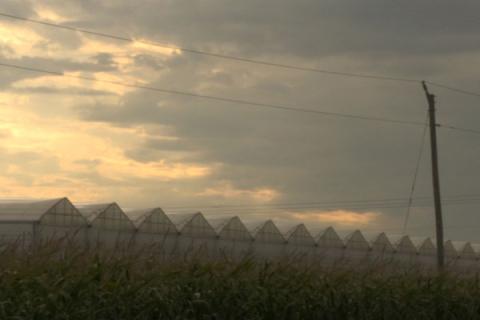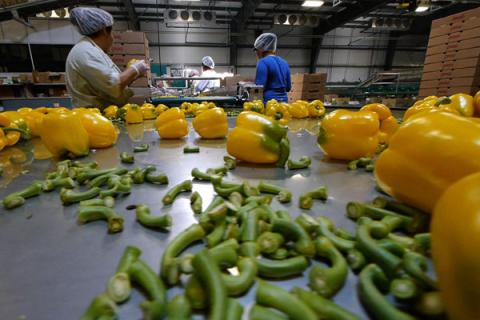
That tomato was likely picked and packed by a temporary foreign worker, someone who was brought into this country under vaguely duplicitous means, to work long hours in tough conditions for what frequently amounts to less than minimum wage. To make matters worse, these labourers sometimes have to pay exorbitant "recruitment" fees in order to secure this work, shackling often already-poor individuals and families with tremendous debts.
Migrant Dreams, the latest feature documentary film by Min Sook Lee, explores the hardships faced by a number of these foreign workers plying their trade in the greenhouses in and around the Leamington, Ontario growing region while organizations like Justice For Migrant Workers look to help the workers out.
Lee's film follows a number of workers whose individual circumstances reveal a pattern of poor treatment. There's Dwipa and Rahmi, a same sex couple whose marriage is considered illicit by some, and who get tricked into working illegally without a proper contract. There's Umi, who moves out of company controlled housing and experiences a number of retaliations — work hours cut, demands that her employer hands over her passport to them — because of it. And then there's "The Recruiter," a shadowy force that's a constant presence in these workers' lives, shaking them down for money, monitoring their behavior and intimidating these labourers.
For many of these workers "Canada the good," the land of opportunity and immigrant dreams, is far away.
Samaritanmag spoke at length to Migrant Dreams director Min Sook Lee about the hardships these workers face, who's to blame for their treatment and what can be done to change things in advance of the film's world broadcast premiere tonight (Sept. 14) on TVO at 9 p.m. and midnight. Here are some important points to consider:
First, to give some very basic context, could you explain how the process of migrant labourers coming to Canada works?
It's currently the dominant means by which migrant workers come to Canada. The TFWP (Temporary Foreign Workers Program) allows bosses to bring in workers from anywhere in the world. It's not constrained to the Caribbean or Mexico, so there are over 80 sending countries that participate in the program. Bosses who are looking for workers often use recruiters to bring migrant workers to work on farms or clean hotels or work at Tim Horton's.
It's a very layered, complex configuration of programs, some that are region-specific and some that are industry-specific, and some that are not. Some that are privatized and some are government regulated, and all of them work with the general understand that non-citizen workers are permitted into Canada on a temporary basis to do work that is manual work, generally low paid, minimum wage and it's called 3D work — dirty, difficult and dangerous. It's work Canadians don't want to do.
What are some of the issues these workers face?
Canada's migrant labour program brings in workers on timed permits and this is the feature of the program that is the most controversial and which constrains the rights of workers to protect and advocate for their human rights. Workers are brought in to Canada and they're tied to one employer. They have no labour mobility and very little social mobility. Often times workers don't speak english, they're isolated, and the time they're in Canada to work here and live here their movements and activities are highly managed and controlled by the boss.
There have been, and continue to be, numerous instances of abuse in the program where workers find difficulties: living conditions have been almost uninhabitable. There have been housing conditions where workers were living in unheated trailers on rural farms, workers living in bunks over a greenhouse. I found a site on a farm where there were 26 workers in a large garage that was used to store equipment, and the workers are stacked in bunk beds. It looks like a refugee camp to me.
Another issue is exposure to chemicals and pesticides while working in greenhouses or farms. Many workers over the years talk about not being trained properly or not having proper protective equipment. I know one worker who lost 80 per cent of the vision in his right eye because of pesticide exposure and he hadn't been trained on what to do when that happened. When workers have workplace injuries oftentimes access to medical care that's timely and appropriate is not afforded to them, despite the fact they're covered under OHIP.
Another concern of workers is non-payment of wages. Workers who are working in greenhouses, if they're picking fruit they're not covered under the Employment Standards Act (ESA) so they're not entitled to overtime, but if they're packing fruit, they are covered under the ESA and they are entitled to overtime, but many workers over the years have reported they're simply not paid overtime. That's wage theft.
What are the hours like for these workers?
The hours can be quite grueling, seven days a week sometimes, 14 to 16 hour days, and it's relentless because you're not paid overtime. It's less than minimum wage they're earning.
One of the other issues that's explained in the movie is the concept of "The Recruiter," someone who finds foreign workers and brings these workers to Canada for a fee. How does that work?
The bosses rely on private recruiters to find the workers and essentially manage them. So recruiters typically are charging workers I've heard of fees as high as $14,000. In the film that I made they were paying $7,500 in recruitment fees, for the privilege of working in Canada, in these minimum wage jobs in greenhouses. Most of these workers come from poor families, they can't afford those recruitment fees so they agree to take on a debt. And they agree to have their wages garnished while working in Canada. So you have migrant workers working already indebted to a private recruiter who's a de facto boss in many ways. This is why the program itself has created a modern form of debt bondage in Canada.
The workers I filmed with through the two years, they were working on one contract in one greenhouse, every week 30 per cent of their salary went to the recruiter. Fifteen per cent went to pay off this debt, and 15 per cent was to pay for the rental accommodations they were living in — and they were crammed, one house had over 20 workers in it — and also charged for travel from home to the greenhouse. So what you're seeing is a picture of widespread exploitation. If workers complain or speak out about workplace conditions then the immediate result is overwhelmingly they're sent back home. They're deemed a "problematic worker." That disproportionate power imbalance between the boss and the migrant worker fundamentally creates conditions for abuse. Migrant workers are in many ways trapped. This is why the observation that they're an unfree workforce is quite accurate.
Who benefits from all this? Are we all to blame because the result is we get to buy red peppers that are five cents cheaper than if workers harvesting them were treated fairly?
I think the thing to recognize is that these programs operate within the broader system of capital and commodity exchange and political power. And the beneficiaries can be defined according to those levels of power in Canada. So clearly obviously all Canadians benefit because, yeah, we get more affordable tomatoes for our pizza. But more pointedly, bosses benefit because they get cheap, exploitable, unfree labour. And more broadly, Canada as an international trading partner benefits because there's an exchange of labour, capital and currency back and forth. So there's many levels of benefit.
Who's responsible? We're all responsible. For a useful conversation we need to speak about the direct responsibility of our federal government and point to the responsibility of bosses.
How risky was it for these workers to speak to you on camera?
I was introduced to the workers through activists in Ontario, who work with migrant workers, Justice For Migrant Workers. The organization has built longstanding, deep relationships of trust with workers in Leamington and I believe that when you make a film like this you have to be prepared to shut it down or adapt what is possible, what is safe to tell depending on the condition. If the release of the film would harm their livelihood, then I couldn't release the film. Or I couldn't tell parts of the story.
The story I was able to tell, I was able to tell because eventually Umi and Dwipa no longer work at that greenhouse. Their own livelihood is not at stake with the release of the film. I'm very mindful of the stakes workers might face by speaking out. I was so completely struck by their resistance and bravery and stubborn insistence that their story be told. Many workers are aware that this is an unfair system. This is not the bill of goods they were sold to come to Canada.
The point was made in the film that if this was white workers — people from, say, the U.S. or Australia or Britain — they'd never be treated this way. How much of this is straight up racism?
Racism is deeply embedded in the program. If you are a temporary foreign worker from Ireland there are agreements between Canada and Ireland that offer different opportunities and pathways to citizenship. It reflects Canada's colonial footprint and the structures and relationships to power that Canada has with different countries and it's very much along raced, gendered structures of power. Racism is implicit and explicit in the program.
In the days and years to come, how do you hope that this film will make a difference?
In 2000 I made a film called El Contrato with the National Film Board of Canada. It looked at the experience of a number of Mexican men working in the Seasonal Agricultural Program. When I released that film I was a much younger person and it was my first film. I remember believing that the film would cause political change. The direct immediate reception of El Contrato was that farmers' bosses issued me a libel notice. So for one year the National Film Board, myself, or anyone who wanted to show the film were issued libel notices and threatened with libel. For one year the film could never be shown. It was shelved and shut down. The National Film Board finally released the film after their lawyers vetted it.
What's interesting for me was how vigorously the industry fought to shut down that film. And they failed.

It makes me fully aware that film has power and so I think some have power to make political change, to make social change, not alone, no film can do that alone, but when it is used as a tool by organizers, by communities, whether you're in the labour community, the faith-based community, the academic community, the political community, film is a very effective tool for building dialogue and creating mirrors for us to see each other more clearly and inspiring people to mobilize for change.
So I hope Migrant Dreams does that. I think you can't watch a story like Migrant Dreams and say "OK, now I don't know." We have kind of a narrative, a mono-narrative that has dominated — Canada the good, open arms for immigrants to succeed, a ladder of success — that reality of immigration is in many ways a fantasy. In reality, the doors are closed. There's many xenophobic, racist sentiments towards immigrants.
What can we do about this?
We really have to take a look at how our own economies are subsidized by the labour of migrant workers, how livelihoods and lifestyles of ordinary Canadian consumers are supported and subsidized by migrant workers. I think we need a really frank and open and honest discussion about the permanent feature of migrant labour in Canada's economy.
The labour is needed. Yet workers have virtually no path to citizenship because they're deemed undesirable. This opens up a bigger question of who's a desirable Canadian. Because the workers are largely racialized from the global south, you're looking at black and brown bodies, who are doing the manual work, who are not seen as fit for Canadian citizenship. They're not part of the old stock definition of what is Canadian. It perpetuates this notion of who belongs in Canada and who deserves the set of human and labour rights that Canada's vaunted for in our national propaganda.
We need to confront what it means to be Canadian?
I think coming to terms with the ugly truths of Canada, whether they're historical or contemporary, can only help us build a future that is truly humanitarian.
Ultimately, when we say we're a country, we're buying into an idea. It's a story. Countries are based on agreed upon values and the agreed upon story of what brought us together, what binds us. If our story is half-truths then our country will continue to be perpetuating abuses and continuing problematic legacies. And I think migrant workers really draw that out. I think if you have a migrant worker, they define citizenship because of their non-citizen status. So are we OK with a two-tiered sets of rights? Are we OK with the concept of citizenship being privileged rights and non-citizens being denied that? That's a real question of what this country stands for, what it will be, and what it upholds and does together.
Watch the Migrant Dreams trailer
/Nike_7_1